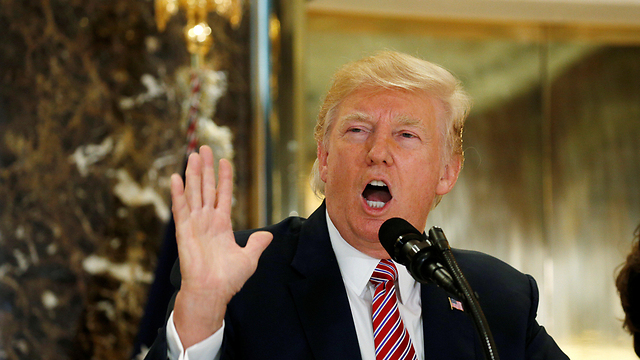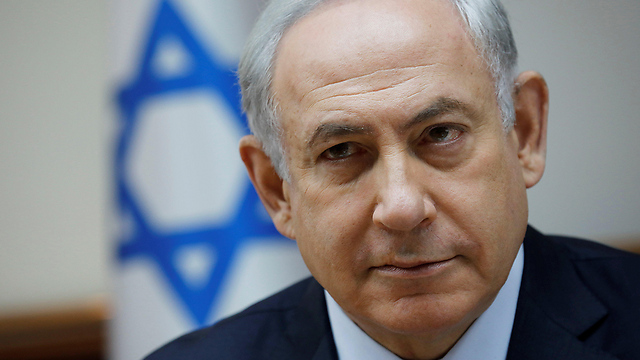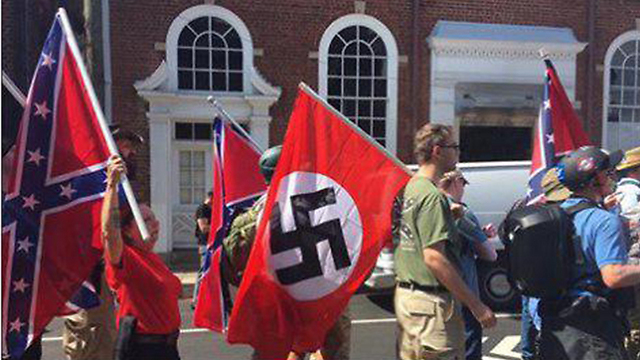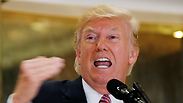
Trump rejects accusations he compared white supremacists to Left
US president says accusations he said there is 'moral equivalency between the KKK, neo-Nazis & white supremacists' and those protesting against them are 'a disgusting lie'; Netanyahu under pressure to speak out against Trump's response to the violence and anti-Semitism in Charlottesville.
US President Donald Trump rejected on Thursday accusations he compared between white supremacists and those who protested against them in Charlottesville, Virginia as "a disgusting lie."
In a daybreak post on his Twitter account, Trump faulted fellow Republican Senator Lindsey Graham for statements he has made about the president's stance on the violence and death of Heather Heyer, the woman who was killed when she was struck by a car driven into the crowd of counter-protesters.
South Carolina Republican Sen. Lindsey Graham, who doesn't face re-election until 2020, said the president "took a step backward by again suggesting there is moral equivalency between the white supremacist neo-Nazis and KKK members who attended the Charlottesville rally" and the people demonstrating against them.
"Many Republicans do not agree with and will fight back against the idea that the party of Lincoln has a welcome mat out for the David Dukes of the world," Graham added, referring to the former Ku Klux Klan leader.
Trump shot back on Thursday on Twitter: "Publicity seeking Lindsey Graham falsely stated that I said there is moral equivalency between the KKK, neo-Nazis & white supremacists and people like Ms. Heyer."
"Such a disgusting lie," Trump said of Graham's remarks. "He just can't forget his election trouncing. The people of South Carolina will remember."
In a separate tweet, Trump accused "the Fake News" of distorting "what I say about hate, bigotry, etc. Shame!"
Trump has acknowledged there were some "very bad people" at Saturday's rally. But he also said there were "very fine people" on both sides. The president's equation of extremist hate groups and left-wing demonstrators garnered condemnation across the American political spectrum.
Criticism over Netanyahu's silence on Trump comments
Meanwhile, Prime Minister Benjamin Netanyahu came under mounting pressure to speak out against Trump's response to the racially charged violence and anti-Semitic outpouring in Charlottesville.
Netanyahu's near silence on the march staged by anti-Semitic white nationalists—and Trump's assertion that "both sides" were responsible for the violence—appears to reflect the prime minister's desire to remain in the good graces of the embattled US president.
But Netanyahu's reluctance to speak out on such an important issue has set him apart from the growing ranks of Israeli leaders who have been outspoken in their anger, and risks alienating Jewish American leaders already estranged by certain Israeli policies.
A growing chorus of opposition politicians, commentators and even coalition partners has urged Netanyahu to take a stronger stance, even at the risk of antagonizing the president.
Though Netanyahu, who views himself as a leader of world Jewry, is ordinarily quick to rail against anti-Semitism, he waited three days to react to the violence in Charlottesville with a relatively tepid statement on Twitter.
"Outraged by expressions of anti-Semitism, neo-Nazism and racism. Everyone should oppose this hatred," he tweeted, avoiding any mention of the president or Charlottesville. No such statement was issued in Hebrew.
After clashing with President Barack Obama for eight years, Netanyahu welcomed the election of Trump, and he has worked to cultivate a strong relationship with the White House. Trump was warmly welcomed during a brief visit to Israel in May, and Netanyahu has repeatedly hailed the president as a "true friend" of Israel.
"He does not want to alienate Trump," said Eytan Gilboa, an expert on US-Israeli relations at Israel's Bar-Ilan University. But in the process, Gilboa said, Netanyahu is pushing American Jews further away.
Trump's handling of the events in Charlottesville has begun to attract concern and criticism in Israel, even among politicians who admire the president.
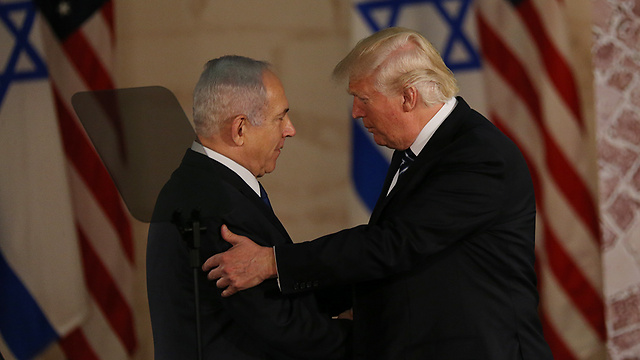
Immediately after Saturday's march, Education Minister Naftali Bennett, leader of the nationalist Bayit Yehudi party, said the waving of Nazi flags and symbols was not only offensive to American Jews, but also disrespected the memory of American soldiers who died fighting the Nazis during World War II.
"The leaders of the US must condemn and denounce the displays of anti-Semitism seen over the past few days," Bennett said.
On Wednesday, President Reuven Rivlin, a member of Netanyahu's Likud Party, sent a letter to the head of a major US Jewish group expressing "support and solidarity" and shock that "the most vicious symbol of anti-Semitism" was being paraded in American streets. "I know that the great nation of the United States of America and its leaders will know how to face this difficult challenge," Rivlin said.
On Thursday, Deputy Defense Minister Eli Ben-Dahan, a member of the Bayit Yehudi party, said Israel "must not stammer or hesitate in the face of anti-Semitism," and leveled a veiled criticism of Netanyahu, saying "apparently some don't want to enrage Trump."
Opposition politicians have been more strident and open in their criticism of Trump.
"When it comes to racism, anti-Semitism and Nazism, there aren't two equal sides—there's good and there's bad. Period," said Tzipi Livni (Zionist Union). She said Thursday that it seemed Netanyahu's silence stems from his fear of angering Trump.
Lawmaker Shelly Yachimovich (Zionist Union), came out swinging against Netanyahu for not speaking out against Trump. "And you, prime minister of the Jewish people in their land, who warns us about the Holocaust every Monday and Thursday, with overdoses of fear and arrogance and weeks of 'Never Again,' what about you?" Yachimovich wrote on Facebook.
Netanyahu's Facebook and Twitter feeds bore no mention of Charlottesville amid the slew of photos of the prime minister and his wife arm-in-arm on their vacation on the shore of the Sea of Galilee.
Netanyahu's son Yair, however, who has a close relationship with his father, caused a public outcry when he appeared to parrot Trump's sentiments. He wrote a Facebook post Wednesday saying the "neo nazis scums in Virginia" are a dying breed, but left-wing anti-fascist and Black Lives Matter groups, who he said hate Israel "just as much," are "getting stronger and stronger and becoming super dominant in American universities and public life."
American Jewish leaders have expressed deep disappointment with Trump. But if Netanyahu continues to remain quiet, that disappointment could quickly spread to him as well. Leaders of liberal Jewish groups, who represent the vast majority of American Jews, are already at odds with the Israeli government over issues such as egalitarian prayer and recognition of religious conversions.
Rabbi Thomas Gutherz, senior rabbi of Congregation Beth Israel of Charlottesville, said he has been too preoccupied with the events in his community to pay attention to the news in Israel. But Rabbi Rick Jacobs, president of the liberal Union for Reform Judaism, the largest American synagogue movement, said the prime minister "did harm to the cause of Israel and the cause of the Jewish people by having such a delayed reaction."
Jacobs said he was particularly surprised by Netanyahu's slow response. "Three days went by without a full-throated condemnation. It was quite distressing," Jacobs said.










